#rpa and automation
Explore tagged Tumblr posts
Text
The Transformative Power Of RPA And AI In Business Processes
In today's fast-paced business landscape, enterprises must continuously evolve and optimize their processes, technology, and people to stay competitive. To achieve this, business leaders are turning to the transformative power of Robotic Process Automation and AI. This combination of technologies, known as hyperautomation, is revolutionizing industries across the board, from healthcare and supply chain to banking and finance, and so on.

In this article, we will explore the immense potential of RPA and AI in driving process efficiency, improving customer experiences, and fostering a culture of innovation.
#RPA And AI#ai technologies#rpa robotics#rpa process automation#rpa and automation#rpa in automation#ai software#vendor management#automation for marketing#business process automation#ai for business#finance ai#ai in businesses#ai in financial#RPA technology#RPA and AI in Vendor Management
0 notes
Text

Future-proof your accounting firm with the powerful combination of AI and RPA! These technologies enhance efficiency, accuracy, and compliance, allowing your firm to focus on strategic insights and growth. Is your firm ready to implement AI and RPA? Explore how Unison Globus can help you navigate the future of accounting automation today! Visit: https://unisonglobus.com/choosing-between-ai-and-rpa-what-us-cpas-and-accounting-firms-need-to-know/
#AI vs RPA in accounting#unison globus#Accounting automation#AI in accounting#RPA in accounting#Benefits of AI for CPAs#Benefits of RPA for accounting firms#AI and RPA integration#Accounting technology trends#RPA for invoicing
1 note
·
View note
Text
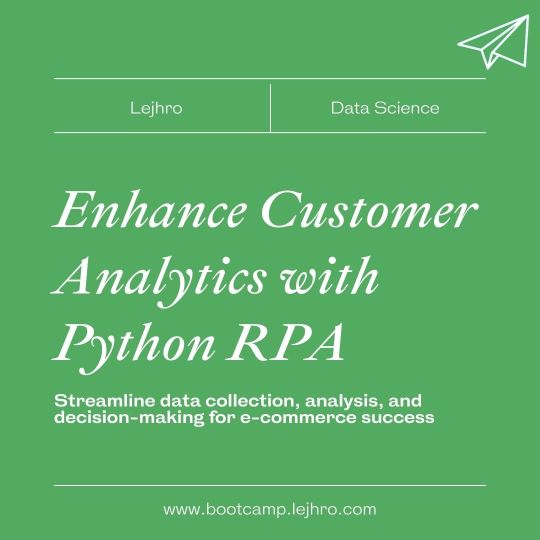
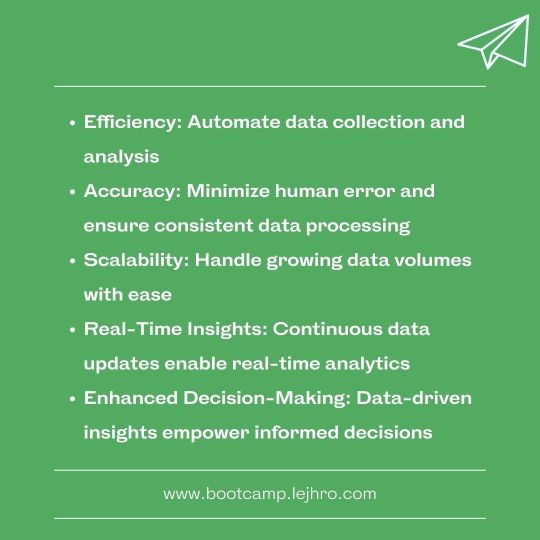
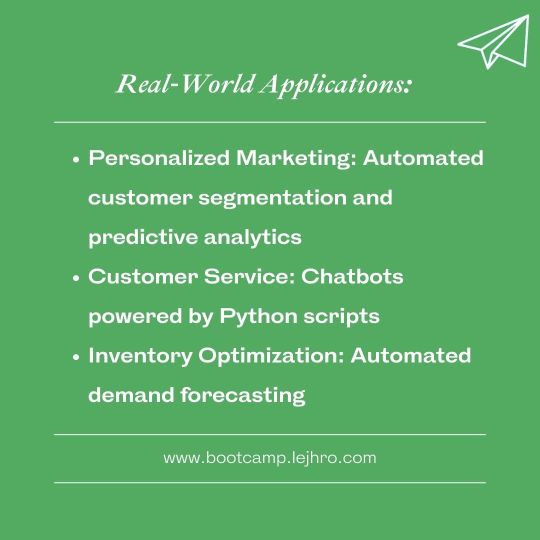

🚀 Boost Your E-commerce Game with Python RPA! 🚀
Enhance customer analytics with Python-based Robotic Process Automation (RPA) and stay ahead of the competition!
💥 Efficiency, accuracy, and scalability - what more could you ask for? 🤔
💥Learn More: www.bootcamp.lejhro.com/resources/python/improving-customer-analytics-in-e-commerce
💥The latest scoop, straight to your mailbox : http://surl.li/omuvuv
#Lejhro#LejhroBootcamp#Ecommerce#Python#RPA#CustomerAnalytics#BusinessGrowth#DigitalTransformation#DataScience#ArtificialIntelligence#MachineLearning#Automation#TechTrends#Innovation#MarketingTips#Ebusiness
2 notes
·
View notes
Text
Elevating Efficiency: AI-RPA Synergy!

The integration of Artificial Intelligence (AI) and Robotic Process Automation (RPA) has catalyzed a transformative shift in the landscape of business automation, leading to the emergence of Intelligent Automation (IA). As organizations increasingly seek innovative solutions to streamline operations, enhance efficiency, and deliver superior customer experiences, the synergy between AI and RPA has become instrumental in achieving these objectives. By combining the cognitive capabilities of AI with the rule-based automation of RPA, IA offers a powerful framework for automating complex processes, optimizing decision-making, and driving digital transformation across industries. This integration empowers businesses to leverage advanced technologies to augment human capabilities, unlock new levels of productivity, and foster a culture of continuous improvement.
Explore how AI and RPA can work together here!
2 notes
·
View notes
Text
Unlocking Efficiency and Innovation: The Role of Robotic Process Automation (RPA)
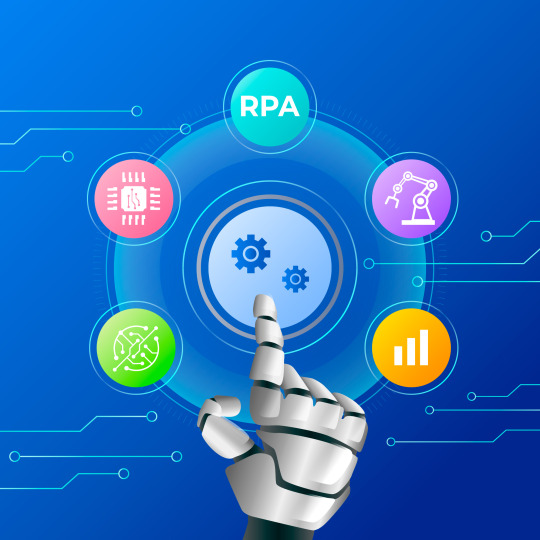
In today's fast-paced and competitive business environment, organizations are constantly seeking ways to improve efficiency, reduce costs, and increase productivity. Robotic Process Automation (RPA) has emerged as a powerful tool that can help businesses achieve these objectives.
What is Robotic Process Automation (RPA)?
Robotic Process Automation (RPA) is a technology that allows businesses to automate repetitive, rule-based tasks. It uses software robots, also known as "bots," to mimic human actions and interact with digital systems. These bots can log into applications, navigate through screens, input data, and complete tasks just like humans would.
The Role of RPA in Business:
RPA can be used to automate a wide range of tasks across various industries and departments. Here are some examples:
Finance and Accounting: Automating tasks such as accounts payable and receivable, invoice processing, and financial reporting.
Customer Service: Automating tasks such as answering FAQs, resolving customer inquiries, and processing orders.
Human Resources: Automating tasks such as onboarding new employees, processing payroll, and managing benefits.
IT: Automating tasks such as provisioning accounts, managing user access, and deploying software updates.
Impact of RPA on Businesses:
Implementing RPA can offer numerous benefits to businesses, including:
Increased efficiency and productivity: RPA can automate time-consuming and tedious tasks, freeing up employees to focus on more strategic and value-added activities.
Reduced costs: RPA can help businesses save money on labor costs, as well as reduce errors and compliance risks.
Improved accuracy and compliance: RPA bots are programmed to follow specific rules and procedures, which can help to improve accuracy and compliance with regulations.
Enhanced process visibility and control: RPA provides businesses with a clear view of their processes, which can help them identify and address bottlenecks.
Improved customer satisfaction: RPA can help businesses improve customer satisfaction by automating tasks such as order processing and customer service interactions.
RPA Services:
Implementing RPA successfully requires a partner with expertise in the technology and a deep understanding of business processes. A comprehensive RPA solution should include the following services:
Document AS-IS Process: This involves mapping out the existing process to identify areas for automation.
Design & Development of Bots, workflows, and forms for process automation: This includes designing and developing the software robots that will automate the tasks.
Bot license (We will use the appropriate underlying technology): This provides access to the software robots and the underlying technology platform.
Infrastructure: This includes setting up the necessary infrastructure to support the Robotic Process Automation (RPA) solution.
Production Deployment of the Bots: This involves deploying the bots to production and monitoring their performance.
RPA support: This includes ongoing support for the RPA solution, such as troubleshooting and maintenance.
Test & Deploy bots to production: This involves testing the bots in a production environment and making any necessary adjustments before they are deployed to full production.
Configuration data changes: This involves making changes to the configuration data of the bots as needed.
Password updates: This involves updating the passwords of the bots as needed.
Errors in executing the Bots: This involves resolving errors that occur during the execution of the bots.
Determining the “root cause” of a recurring issue or incident & recommendations: This involves identifying the root cause of a recurring issue or incident and recommending solutions to prevent it from happening again.
Infrastructure/application related issues: This involves resolving issues with the infrastructure or applications that the bots are interacting with.
Conclusion:
RPA is a powerful technology that can have a significant impact on businesses of all sizes. By automating repetitive tasks, RPA can help businesses improve efficiency, reduce costs, and increase productivity. However, it is important to choose a reputable Robotic Process Automation (RPA) companies with the expertise and experience to help you implement a successful RPA solution.
Ready to embrace the power of RPA?
Contact us today to learn more about how RPA can help your business achieve its goals.
#robotic process automation#robotic process automation rpa#rpa automation#robotic process automation software#rpa software#robotic process automation companies#robotic process automation technology#robotic process automation in healthcare#robotic process automation in banking#rpa solution#robotic process automation for finance#process automation solution#robotic process automation services#robotic process automation for insurance#rpa system#what is rpa automation#robotic process automation solution#robotic process automation benefits#robotic process automation consulting#robotic process automation consultant#rpa service provider#rpa consulting services
2 notes
·
View notes
Text
The Top Choice: Oracle Enterprise Resource Planning Cloud Service for Your Business Success
Are you searching for the best solution to streamline your business operations? Look no further than the Top Choice: Oracle Enterprise Resource Planning (ERP) Cloud Service. In today's fast-paced business world, organizations need a robust ERP solution to optimize their processes, enhance productivity, and drive growth. Oracle ERP Cloud Service, crowned as the best in the industry, offers a comprehensive suite of tools designed to meet the demands of modern businesses.
Why Choose the Best: Oracle Enterprise Resource Planning Cloud Service?
Oracle ERP Cloud Service stands out as the Best Option for businesses across various industries. Here's why:
Scalability: Easily scale your ERP system as your business grows, always ensuring seamless operations.
Integration: Integrate ERP with other Oracle Cloud services for a unified business platform.
Real-time Insights: Gain valuable insights into your business with real-time analytics, enabling data-driven decision-making.
Security: Rest easy knowing your data is secure with Oracle's advanced security features.
Frequently Asked Questions about the Best Choice: Oracle ERP Cloud Service
Q1: What modules are included in Oracle ERP Cloud Service?
A1: Oracle ERP Cloud Service includes modules for financial management, procurement, project management, supply chain management, and more. Each module is designed to optimize specific aspects of your business.
Q2: Is Oracle ERP Cloud Service suitable for small businesses?
A2: Yes, Oracle ERP Cloud Service is scalable and can be tailored to meet the needs of small, medium, and large businesses. It offers flexible solutions suitable for businesses of all sizes.
Q3: How does Oracle ERP Cloud Service enhance collaboration among teams?
A3: Oracle ERP Cloud Service provides collaborative tools that enable teams to work together seamlessly. Features like shared calendars, document management, and task tracking enhance communication and collaboration.
Conclusion: Empower Your Business with the Best ERP Solution
Oracle Enterprise Resource Planning Cloud Service is not just a choice; it's the Ultimate Solution for businesses seeking to optimize their operations. By harnessing the power of Oracle ERP, you can streamline processes, improve efficiency, and drive innovation. Don't let outdated systems hold your business back. Embrace the future with Oracle ERP Cloud Service and propel your business to new heights.
Ready to transform your business? Contact us today to explore the endless possibilities with the best ERP solution on the market.
#oracle#oracle erp#rapidflow#oracle erp cloud service#best erp solution#oracle erp service providers#business#business automation#oracle services#enterprise software#scalability#integration#rpa#market#erp
3 notes
·
View notes
Text
Revolutionize Field Efficiency with AI‑Powered WhatsApp Chatbots
Meet the future of mobile workforce support: an AI-driven WhatsApp chatbot that gives your field teams instant, 24/7 access to HR/IT help, how‑to guides, micro‑learning modules, and more — without switching apps. Powered by AutomationEdge, this GenAI‑infused bot understands context, automates workflows, and integrates with your enterprise systems to boost productivity and morale 💡.
Why it matters:
Employees get answers instantly
Service desks operate more efficiently
Costs drop as repetitive tasks are automated
Works across languages & time zones, even offline messages queue up for later
Integrates seamlessly with existing systems via APIs Curious to see how your frontline teams can work smarter? Check it out here: https://automationedge.com/blogs/ai-whatsapp-chatbot-mobile-workforce/
#AI#WhatsAppBot#GenAI#WorkforceEfficiency#MobileWorkforce#Automation#RPA#EmployeeExperience#TechInnovation
0 notes
Text

Kanta Transfer Saves Central Uusimaa Nearly €1M Annually
Kanta Transfer Success: The Wellbeing Services County of Central Uusimaa Retires Legacy Systems, Saving Nearly €1M Annually.
0 notes
Text
Empowering Businesses with Automation Allies
In today’s rapidly evolving technological landscape, businesses are increasingly turning to automation to streamline operations, boost efficiency, and stay competitive. At GQAT Technologies, our Automation Allies initiative is at the forefront of this transformation, offering innovative solutions to help companies harness the power of automation. Here’s how our cutting-edge automation services can empower your business to thrive in the digital age.
What Are Automation Allies?
Automation Allies, as offered by GQAT Technologies, is a suite of automation solutions designed to optimize business processes across industries. From robotic process automation (RPA) to artificial intelligence (AI)-driven workflows, our services integrate seamlessly with your existing systems to deliver measurable results. Our goal is to act as your trusted partner, or "ally," in navigating the complexities of automation and unlocking new opportunities for growth.
As highlighted in the industry, automation is reshaping how businesses operate, with tools like RPA and AI agents driving significant cost savings and productivity gains. For instance, companies leveraging advanced automation systems have reported savings of up to $120 million in just weeks by optimizing high-stakes workflows. At GQAT, we tailor our solutions to meet your unique needs, ensuring maximum impact.
Key Benefits of Automation Allies
Our Automation Allies services are built to deliver tangible benefits that drive business success. Here’s what you can expect:
1. Enhanced Efficiency with Robotic Process Automation (RPA)
RPA is a game-changer for repetitive, rule-based tasks. Our Automation Allies platform uses intelligent bots to automate processes like data entry, invoice processing, and customer onboarding. By reducing manual effort, businesses can save time and redirect resources to strategic initiatives. For example, industry leaders have achieved 150,000 hours of annual savings by automating routine tasks.
2. AI-Powered Decision Making
Our AI-driven solutions, inspired by advancements like those from Automation Anywhere, enable context-aware automation. Using tools like the Process Reasoning Engine, we help businesses automate complex workflows with precision. Whether it’s analyzing customer data or optimizing supply chains, our AI agents make decisions faster and smarter, boosting productivity across the board.
3. Scalable and Modular Solutions
At GQAT, we understand that every business is unique. Our Automation Allies services are modular and scalable, allowing you to start small and expand as your needs grow. Similar to the modular packaging systems offered by Allied Technology, our solutions integrate seamlessly into existing workflows, ensuring flexibility and future-proofing your operations.
4. Cost Savings and ROI
Automation isn’t just about efficiency—it’s about profitability. By automating high-volume tasks like accounts payable or customer support, businesses can achieve significant cost reductions. One industry case study reported a $19 million reduction in provisioning costs through automation. With GQAT’s tailored approach, you’ll see a strong return on investment in no time.
5. Seamless Integration and Security
Our solutions prioritize connectivity and security. With built-in governance and enterprise-grade guardrails, we ensure your data remains protected while integrating with your existing systems. This aligns with industry best practices, such as those seen in Automation Anywhere’s CoE Manager, which centralizes initiatives and enhances security.
Real-World Impact
Businesses across sectors are already reaping the rewards of automation. For example, a manufacturing client using solutions similar to those offered by GQAT saw a 45% increase in production efficiency after implementing robotic palletizing and process automation. Another client in the financial sector streamlined KYC/AML workflows, reducing processing times by 30%. These success stories demonstrate the transformative power of automation when paired with the right expertise.
Why Choose GQAT’s Automation Allies?
At GQAT Technologies, we go beyond technology implementation. We act as your strategic partner, combining technical expertise with industry insights to deliver solutions that align with your goals. Here’s what sets us apart:
Customized Solutions: We design automation workflows tailored to your specific industry and business needs.
Expert Support: Our team of certified professionals, inspired by the expertise of companies like Alies Automation, ensures seamless implementation and ongoing support.
Global Perspective: Drawing from the global reach of partners like the Automation Alliance Group, we bring international best practices to your doorstep.
Focus on ROI: Our data-driven approach ensures measurable outcomes, from cost savings to enhanced productivity.
The Future of Automation
The automation landscape is evolving rapidly, with innovations like AI agents, cloud-based RPA, and flexible manufacturing systems leading the charge. As noted in industry reports, the global shipment of industrial robots reached over 505,000 units in 2024, underscoring the growing adoption of automation. At GQAT, we’re committed to staying ahead of the curve, offering solutions that prepare your business for the future.
Get Started with Automation Allies
Ready to transform your business with automation? GQAT Technologies’ Automation Allies is here to guide you every step of the way. Whether you’re looking to automate repetitive tasks, enhance decision-making with AI, or scale your operations, we have the expertise and tools to make it happen.
Contact us today at GQAT Technologies for a free consultation and discover how Automation Allies can empower your business to achieve more.
#Automation#Robotic Process Automation (RPA)#Artificial Intelligence (AI)#Business Efficiency#Cost Savings#Process Optimization#GQAT Technologies#Automation Allies#Digital Transformation#Scalable Solutions#GQATTECH
0 notes
Text
AI and Automation in June 2025: Top Enterprise Shifts

June 2025 marked a turning point in enterprise technology, where artificial intelligence and automation moved from experimental to essential. In this blog, Infosprint Technologies breaks down six significant AI and automation developments every business leader needs to know — from OpenAI’s release of the reasoning-driven o3-Pro model to Anthropic’s launch of Claude Gov, a government-grade secure AI platform.
We also explore how giants like Salesforce, AWS, SAP, UiPath, and IBM are embedding generative AI into real-world business systems. Think: bots that navigate complex UIs, AI that drafts emails from your data, and cloud-based RPA tools that your HR or finance team can build without code.
Key Highlights:
OpenAI’s o3-Pro is up to 80% cheaper, making deep AI accessible to SMBs.
Anthropic’s Claude Gov shows the future of regulated, secure AI for defense and government.
Salesforce and SAP are enabling AI agents to interact with CRMs and ERP systems in real time.
UiPath and IBM are moving RPA from IT-only tools to enterprise-wide automation frameworks.
The rise of agentic AI means bots now decide, adapt, and act — not just follow rules.
Whether you’re a CIO, CTO, or business strategist, this blog offers a roadmap for navigating AI transformation in Q3 and beyond.
#ai and automation in june 2025#enterprise AI integration#generative AI partnerships#agentic AI applications#cloud-based automation tools#AI workflow automation#secure AI deployment#what is agentic AI#how Claude Gov works#benefits of o3-pro#RPA for compliance#AI in ERP systems
0 notes
Text
RPA Automation: Transforming Business Operations for Maximum Efficiency
In today's rapidly evolving digital world, businesses are constantly seeking ways to improve efficiency, reduce operational costs, and enhance productivity. One of the most powerful tools revolutionizing industries across the globe is Robotic Process Automation (RPA). RPA automation is enabling businesses to automate repetitive tasks, streamline workflows, and optimize resources, leading to significant improvements in operational efficiency and overall business performance.
Understanding RPA Automation
Robotic Process Automation (RPA) is a technology that allows businesses to deploy software robots, or "bots," to execute rule-based tasks that were traditionally performed by human employees. These bots interact with digital systems and applications just like humans do but with greater speed, accuracy, and consistency. Unlike traditional automation, which requires complex coding, RPA automation is designed to be user-friendly, making it accessible for organizations of all sizes.
By leveraging RPA solutions, companies can automate tasks such as data entry, invoice processing, report generation, customer service inquiries, and compliance checks, significantly reducing manual workload and operational inefficiencies.
Key Benefits of RPA Automation
1. Increased Efficiency and Productivity
RPA bots operate 24/7 without breaks, completing tasks much faster than humans. This leads to a significant boost in productivity, allowing employees to focus on strategic initiatives rather than mundane, repetitive work.
2. Cost Savings and ROI
By automating routine processes, businesses can reduce labor costs and operational expenses. Many companies report a high return on investment (ROI) within months of implementing RPA solutions, making it a cost-effective strategy for digital transformation.
3. Accuracy and Compliance
Human errors in data processing and documentation can lead to costly mistakes and compliance risks. RPA ensures high accuracy, reducing errors and maintaining compliance with regulatory requirements.
4. Scalability and Adaptability
RPA solutions are highly scalable, allowing businesses to automate a few processes initially and expand automation capabilities as needed. This flexibility makes it an ideal solution for companies looking to grow without significantly increasing operational costs.
5. Enhanced Customer Experience
With RPA handling routine tasks, customer service teams can focus on delivering personalized and high-quality customer support. Faster response times and improved service quality lead to higher customer satisfaction and loyalty.
Industries Benefiting from RPA Automation
The versatility of RPA makes it an invaluable asset across various industries. Here’s how different sectors are leveraging RPA solutions:
1. Banking & Finance
Banks and financial institutions use RPA automation for fraud detection, transaction processing, loan approvals, and regulatory compliance. Automating these processes improves efficiency and reduces operational risks.
2. Healthcare
The healthcare sector benefits from RPA in areas such as patient record management, billing, appointment scheduling, and claims processing. Automating these workflows enhances accuracy and improves patient care.
3. Retail & E-commerce
Retailers leverage RPA to automate order processing, inventory management, and customer support, leading to improved efficiency in supply chain operations and seamless customer experiences.
4. Manufacturing
Manufacturers use RPA for inventory tracking, production scheduling, and quality control. This automation streamlines production processes and minimizes operational downtime.
5. Human Resources (HR)
HR departments utilize RPA for payroll processing, employee onboarding, resume screening, and compliance management, allowing HR professionals to focus on talent development and employee engagement.
How to Implement RPA Automation Successfully
For businesses looking to integrate RPA automation into their operations, following a structured approach ensures a smooth transition and maximum benefits.
1. Identify Automation Opportunities
Analyze business processes to determine repetitive, rule-based tasks that can be automated for maximum efficiency gains.
2. Select the Right RPA Platform
Choose an RPA solution that aligns with your business requirements and integrates seamlessly with your existing IT infrastructure.
3. Develop and Test RPA Bots
Design and configure RPA bots to perform specific tasks, followed by rigorous testing to ensure functionality, accuracy, and efficiency.
4. Deploy and Monitor Performance
Implement RPA bots into live operations and continuously monitor their performance, making necessary adjustments to optimize workflow.
5. Scale and Expand Automation
Once RPA proves successful in initial applications, expand its use to other departments and processes to maximize efficiency gains across the organization.
The Future of RPA and Intelligent Automation
As technology evolves, RPA automation is becoming even more powerful with advancements in Artificial Intelligence (AI) and Machine Learning (ML). The integration of AI-driven capabilities with RPA is giving rise to Intelligent Automation (IA), allowing bots to handle more complex processes that require decision-making, predictive analytics, and cognitive capabilities.
Key trends shaping the future of RPA include:
Hyperautomation—The combination of RPA with AI, analytics, and other technologies to achieve end-to-end process automation.
Cloud-Based RPA Solutions—Making automation more accessible and scalable for businesses of all sizes.
AI-Powered Chatbots—Enhancing customer service automation with AI-driven interactions.
Process Mining & Optimization—Identifying automation opportunities with real-time data insights.
Businesses that embrace RPA automation and intelligent automation will gain a competitive advantage by enhancing operational agility, improving decision-making, and driving continuous innovation.
Conclusion
RPA automation is redefining business operations, offering substantial benefits in terms of efficiency, accuracy, and cost savings. As industries continue to embrace digital transformation, the adoption of RPA solutions is no longer optional but essential for maintaining a competitive edge.
By implementing RPA automation from a trusted provider like Spearhead Technology, businesses can unlock new levels of productivity, optimize workflows, and drive sustainable growth.
Now is the time to explore how RPA can revolutionize your business. Take the first step towards automation and experience the power of intelligent process automation today!
0 notes
Text
Principal Software Development Engineer in Test (SDET)
Job title: Principal Software Development Engineer in Test (SDET) Company: Capco Job description: , pregnancy loss, fertility treatment, menopause, and bereavement QA and Automation at Capco Be creating, driving and building… and execute tests using the latest UI/Mobile test automation technologies, processes and tools to deliver frequently, safely… Expected salary: Location: London Job date:…
#Automotive#Azure#Broadcast#business-intelligence#cleantech#CRM#Cybersecurity#data-privacy#data-science#digital-twin#erp#ethical-hacking#game-dev#gcp#generative AI#healthtech#iot#it-support#low-code#NFT#NLP#power-platform#proptech#Python#QA Automation Engineer#qa-testing#regtech#rpa#telecoms
0 notes
Text
As technology continues to reshape the accounting industry, Artificial Intelligence (AI) and Robotic Process Automation (RPA) have emerged as two leading solutions for enhancing efficiency and accuracy. While both technologies offer significant advantages, understanding their distinct roles is crucial for US-based CPAs, EAs, and accounting firms seeking to optimize their processes.
This blog explores AI vs. RPA in accounting, their applications, benefits, and how to determine the best fit for your firm.
#AI in Accounting#unison globus#RPA for CPAs#Accounting Automation#CPA Technology Trends#AI Benefits for Accountants#RPA Implementation in Accounting#Future of Accounting Technology#AI and RPA Integration#RPA solutions for US accounting firms#Future trends in AI and RPA for accountants
1 note
·
View note
Text
#B2B Supply Chain#B2B Supply Chain Management#B2B audience#B2B companies#Artificial Intelligence (AI)#Machine Learning (ML)#Robotic Process Automation (RPA)#Acceligize
0 notes
Text
Automate & Optimize Operations with Robotic Process Automation Services
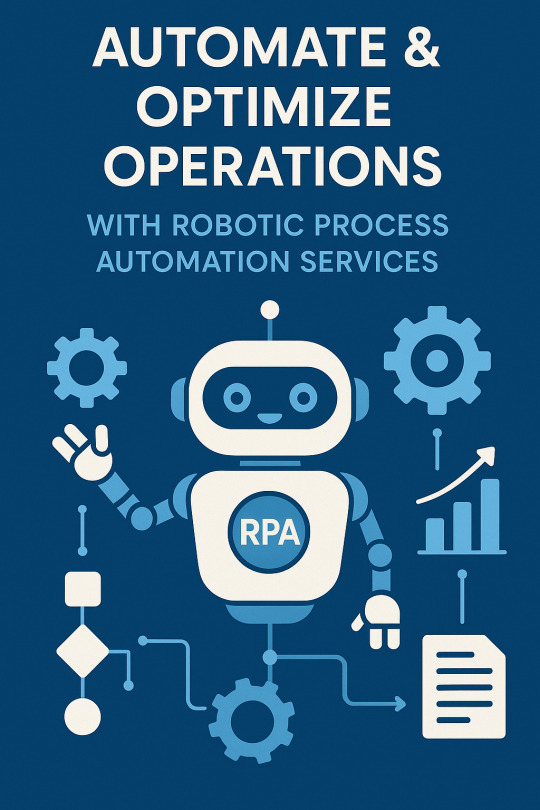
Robotic Process Automation (RPA) enables businesses to automate repetitive, rule-based tasks, boosting efficiency, accuracy, and productivity. With industry-leading UiPath RPA services, companies across sectors like banking, healthcare, insurance, logistics, HR, and manufacturing can reduce operational costs and focus on high-value tasks. From RPA consultation and bot development to AI integration, RPA is transforming digital operations. ESS offers tailored, scalable RPA solutions powered by UiPath, helping businesses streamline workflows, improve compliance, and accelerate growth. Leverage the power of automation to achieve seamless, intelligent operations and empower your workforce for strategic success.
0 notes